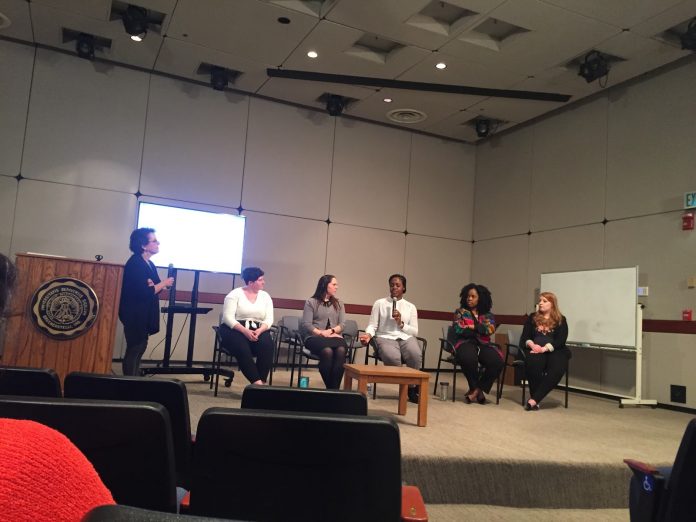
The workplace has historically been male-dominated in many professions. This domination has caused difficulties for some women who work in professions that are historically male-dominated.
Five recent DePauw alumni returned to campus on March 19 to participate in a panel discussing issues of navigating the workplace, professional attire and sexist experiences.
Along with talking about the workplace, some panelists discussed challenges they faced in graduate school. DePauw’s Pre-Law advisor Nicole Burts ‘13 majored in Anthropology at DePauw and attended Indiana University Robert H. McKinney School of Law. Other panelists included Carrie Birge '08 and Anika Green ‘16.
Burts said the majority of her division at law school was males, and of the females, about six were women of color. “Any time women of color would talk in class, you would hear sighing,” Burts said.
As a woman, Burts felt that she was not taken as seriously by her male classmates. However, she attributes her minor in Women, Gender and Sexuality studies for giving her the skills and tools to navigate through the male-dominated classes. “[You need to] pick your battles right,” Burts said. “It becomes very exhausting as a women within the patriarchy to constantly be correcting people.”
While Burts felt pushback from her classmates, Caitlin Qua ‘16, a graduate assistant at Indiana University Arts and Humanities Council, has felt resistance from her male bosses. Qua graduated from DePauw with a major in Art History and minor in Women Gender Sexuality Studies.
Although Qua’s bosses asked the staff and graduate assistants for ideas, trying to make the environment collaborative and equal, she said that their ideas were never picked up. “When your ideas are constantly asked to be input, but constantly ignored, it's discouraging,” Qua said.
Qua recalled an instance where she questioned her boss about a decision made, in which he responded that a male student and him had discussed it after work over a beer, an interaction that would have been inappropriate with a female student.
Staci Orr double majored in Biology and History, graduating DePauw in 2011. Orr is currently working for the government as a project manager with Water Resources and Infrastructure Planning Program at the Indiana Financial Authority.
Orr has found that her male coworkers are trusted by new clients immediately, while she has to prove herself. “The greatest challenge is having them take me seriously,” Orr said.
Dressing hyper-feminine is one technique that multiple panel guest use in order to be considered professional and reputable. “What you wear and how you carry yourself is very important,” Orr said. “In order for them to take you seriously, you have to play by their rules.”
When Burts first started practicing law, she was advised that as a female she should always bring an extra pair of stockings and to wear a wedding band, even if she was not married. According to Burts, one female lawyer chose not to follow the second piece of advice when presenting a murder trial to a jury. It later came out that the verdict took so long due to male jurors debating if she is single or not. “I had this notion before going into criminal law that it doesn’t matter, as long as you have the information,” Burts said. “At the end of the day, it’s more important to get your case across.”
Although wearing a skirt and heels to be taken seriously seems ridiculous, Burts looks on the bright side. “When I wear heels it makes me taller than the men. It gives me dominance over the men [in court],” Burts said.
Sophomore Megan Haltom thought that the panel was beneficial because it raised awareness about sexism and racism in public spheres. “A positive thing that came from that was giving each other advice on how to tackle these situations in the workplace that aren't really talked about,” Haltom said.
The panelists offered a glimpse into what it is like to navigate the work force and gave advice on how best to do that. Haltom thought the panel was insightful. “Things have not changed as much as I hoped they had. Women are still having to figure out ways to navigate the workplace in ways that men have never had to,” Haltom said. “Another takeaway would also be the importance of who you're working with, and I think from hearing this panel I will be more aware of the environment and the hierarchical structure of my work place before committing myself to it.”
Despite the lack of progress and barriers that women still experience in the workforce, these panelists, and many other thriving women, have proven that it is possible to successfully navigate any career field. “Don’t let this dishearten you from what you want to do,” Orr said. “Especially if it is in a male dominated field.”
